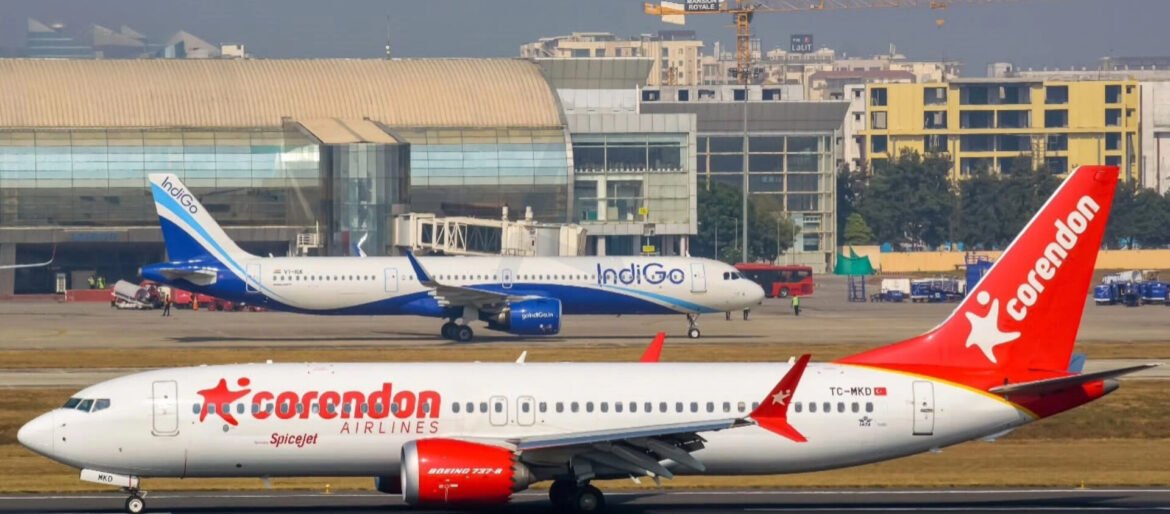India’s largest low-cost carrier, IndiGo Airlines (6E), has turned to wet leasing additional Boeing 737 MAX aircraft to ensure its operations continue smoothly amidst the grounding of its Airbus fleet. In a significant move, the airline has inducted two Boeing 737 MAX 8 aircraft on a wet lease from Corendon Airlines, a Turkish leisure carrier known for its diverse narrowbody fleet. These two 737 MAX 8s, registered as TC-MKC and TC-MKD, arrived in India on December 8-9, 2024, marking a critical step in IndiGo’s effort to maintain capacity while managing the grounding of its Airbus planes.
Wet leasing is a type of aircraft lease where one airline (the lessee) leases an aircraft from another (the lessor) along with a crew, maintenance, and insurance under the lessor’s Air Operator Certificate (AOC). In this arrangement, the lessee compensates the lessor based on the aircraft’s usage, typically calculated by the number of flight hours or flights operated. This type of leasing offers flexibility and quick deployment of additional aircraft without the long-term commitment of outright ownership or dry leasing, where the lessee handles the aircraft’s operations, including crew, maintenance, and insurance.
For IndiGo, the decision to wet lease Boeing 737 MAX aircraft comes at a crucial time, as the grounding of its Airbus fleet has created operational challenges. While specific reasons for the Airbus fleet’s grounding have not been publicly disclosed, the move to bring in Boeing 737 MAX aircraft demonstrates IndiGo’s proactive approach in managing its fleet and ensuring minimal disruption to its schedule. The addition of the two 737 MAX aircraft will provide a much-needed boost to IndiGo’s capacity, helping the airline meet its flight demands, especially during peak periods and the upcoming holiday season.
IndiGo’s wet lease arrangement with Corendon Airlines is a part of a broader strategy that has seen airlines across the globe increasingly rely on such leasing contracts to address fleet shortages, maintenance issues, or to temporarily expand operations. Corendon Airlines, which operates a fleet primarily composed of narrowbody aircraft, has entered into a wet lease agreement with IndiGo to help it meet its operational needs in the short term. This partnership also underscores the growing trend of airlines cooperating through leasing arrangements, especially in times of fleet shortages or operational disruptions.
The Boeing 737 MAX is a highly efficient aircraft with a range of modern features designed to reduce fuel consumption and increase operational efficiency. With IndiGo already operating a significant number of Boeing 737 aircraft, the addition of the 737 MAX aligns well with the airline’s existing fleet, offering a smooth integration process. The 737 MAX aircraft’s fuel efficiency will help IndiGo reduce operating costs, especially as the airline navigates the challenges posed by fluctuating fuel prices and increased competition in the Indian aviation market.
This move by IndiGo highlights the airline’s ability to adapt quickly to changing circumstances and ensure that it continues to provide reliable service to its passengers. With the airline industry continuing to recover from the impacts of the COVID-19 pandemic, such strategic decisions will be critical in maintaining competitiveness and customer satisfaction. The grounding of part of IndiGo’s fleet, while presenting challenges, has not dampened its growth trajectory. The wet leasing of additional 737 MAX aircraft shows IndiGo’s commitment to maintaining its position as India’s leading low-cost carrier and further solidifying its dominance in the competitive aviation sector.
In conclusion, IndiGo’s decision to lease two Boeing 737 MAX aircraft from Corendon Airlines represents a strategic response to the grounding of its Airbus fleet. Through wet leasing, the airline can quickly expand its operational capacity and continue to serve its vast customer base. As the airline industry continues to evolve, such flexible leasing arrangements are likely to become a common strategy for managing fleet needs, operational challenges, and competitive pressures. For IndiGo, this move ensures that it can maintain its growth momentum while continuing to deliver the quality service that has made it a favorite among Indian travelers.

